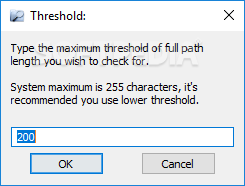
TLPD
4.6.0.1Scan entire drives or custom folders to locate folders and files which exceed the path character limit of 250 in a fast, efficient scan operation
Sure enough Windows needs to provide basic functionality for most activities you want or need to perform, but it does come with some limitations or issues. One of them refers to long path names, which can lead to inaccessible files. In this regard, TLPD comes as a simple method of checking custom directories for paths exceeding specific lengths.
The overall process doesn’t take a lot of time, especially if you attempt to scan a single location. The name, TLPD, stands for Too Long Paths Detector, which is the core, and only function of the application. At startup, you’re asked whether or not to have the entire computer scanned, or just a specific folder.
When the scan process is done, your default text editor is brought up with a report. The threshold, which you specify, is shown, as well as every detected file and path exceeding this quota. What’s more, the total amount of characters in the path is shown, and you can easily save the report to file.
Can be used on the go
Since the application doesn’t need to be installed, you can easily store it on a thumb drive to carry it along on a thumb drive to use on other computers besides your own. As a direct consequence, target system registry entries are not modified in the process, so you don’t have to worry about the health status of the computer you’re running it on.The overall process doesn’t take a lot of time, especially if you attempt to scan a single location. The name, TLPD, stands for Too Long Paths Detector, which is the core, and only function of the application. At startup, you’re asked whether or not to have the entire computer scanned, or just a specific folder.
Scans custom locations and displays reports
This decision doesn’t affect the process, but the more complex, and large the target directory and drive, the more it takes to retrieve results. The application doesn’t put noticeable strain on functionality or stability during the scan operation, and it quietly sits in the tray area until paths are detected. The scan script can be paused at the press of a button.When the scan process is done, your default text editor is brought up with a report. The threshold, which you specify, is shown, as well as every detected file and path exceeding this quota. What’s more, the total amount of characters in the path is shown, and you can easily save the report to file.
To end with
All things considered, we can state that TLPD is a practical application which can save you some stress when trying to open some files or folder, but run into issues because of length concerns. Although it doesn’t move files, it helps identify them in an easy, fast process, which you can also start from a thumb drive.893 KB
Info
Update Date
Nov 10 2020
Version
4.6.0.1
License
GPLv2
Created By
Or Ben Shabat
Related software System







